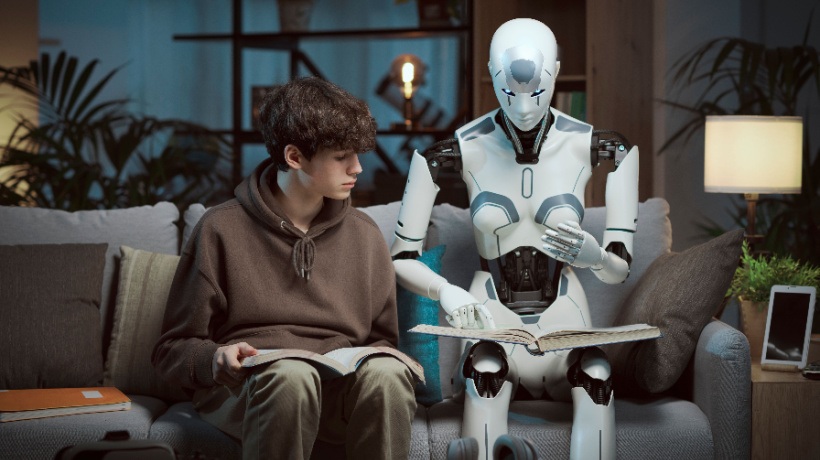Introduction
In the field of education, Artificial Intelligence has the potential to revolutionize student learning. This essay will examine the possible advantages that artificial intelligence (AI) may have on students in the future, transforming the way they study, interact, and perform academically.
- Personalized Learning:
AI has the power to completely transform this approach. Every student’s unique needs by using AI-powered algorithms which help them in various Educational platforms can customize activities and learning materials. AI systems can modify the curriculum to guarantee the best possible learning outcomes for every student by evaluating data on the strengths, weaknesses, and progress of each student. This individualized strategy maximizes learning, increases motivation, and improves student engagement.
- Intelligent Tutoring Systems:
AI can create intelligent tutoring systems that give students individualized direction and assistance. However, these systems converse with students in real-time, answering their queries, giving clarifications, and delivering focused feedback. This is done by utilizing machine learning and natural language processing algorithms. Therefore, by enabling students to ask for help when they need it. Therefore, intelligent tutoring systems improve students’ comprehension of difficult subjects and encourage self-directed learning.
- Improved Accessibility:
AI can meet students’ various learning needs, including those who have special needs or disabilities. However, AI technologies can offer real-time captioning, text-to-speech capabilities, and adaptable interfaces. This is done through the use of speech recognition, natural language processing, and computer vision. Therefore, these features will increase the accessibility of educational resources for all students.
- Collaborative Learning and Virtual Classrooms:
AI can support online platforms and simulated classrooms for collaborative learning. However, AI-powered solutions can promote peer-to-peer contact, facilitate group initiatives, and enable smooth communication. Moreover, AI-enabled virtual classrooms offer chances for cross-cultural dialogue, international relationships, and cooperative problem-solving. As a result, learning is promoted in a lively and welcoming atmosphere, equipping students for the globalized workplace.
- Adaptive Learning Paths:
However, AI is able to design learning paths that change dynamically in response to the learning styles and progress of students. Therefore, artificial intelligence systems are able to pinpoint areas in which students can benefit from more guidance or difficulty.
- Virtual Reality and Augmented Reality:
By combining AI with virtual reality (VR) and augmented reality (AR) technology can produce Immersive learning experiences. This innovation also enables students to explore and engage with virtual worlds and handle the most difficult tasks. Therefore, by tailoring these simulations to each learner’s unique needs and offering immediate feedback. Also, AI algorithms can produce memorable and captivating educational experiences.
- Intelligent Content Creation:
However, AI can help students with content creation, including research papers, essays, and presentations. Algorithms for machine learning along with natural language processing can evaluate student work and make recommendations for enhancements to grammar, style, or organization. Therefore, with this technology students can improve their communication skills and successfully express their views with the help of powered by artificial intelligence content creation tools. Assignment Help UAE me in gathering this piece of content.
- Predictive Analytics for Student Success:
However, AI may be used to identify at-risk students who might need more support as well as anticipate student success. Therefore, AI systems can alert teachers to possible problems a student might encounter by examining past data and student performance trends. This makes it possible to implement preventative measures to help students stay on track and meet their academic objectives. Which includes individualized mentorship or tutoring.
- Ethical Decision-Making and Prejudice Detection:
However, AI can help raise students’ awareness of prejudice in technology and teach them how to make ethical decisions. Therefore, Pupils can gain knowledge of the moral ramifications of AI algorithms. However, this is the value of data security and privacy, and how to assess AI systems’ fairness. Students learn more and become more responsible users when ethical considerations are incorporated into their curriculum.
- Emotional Support and Mental Health:
However, students can receive emotional support and mental health resources via chatbots driven by artificial intelligence. Therefore, when necessary, these chatbots may connect users with mental health services, give coping mechanisms, and have sympathetic chats. In addition to traditional support services, AI-driven emotional support systems make sure that students can get help even when regular counseling hours are over.
- Lifelong Learning and Skill Development:
AI makes it possible to continue learning new things and honing existing ones. Personalized recommendations and flexible learning environments allow students to keep learning new things all their life. However, AI systems can recommend courses that are pertinent to students’ interests, help with ongoing professional growth, and pinpoint areas in which they can further their skills.
In conclusion, artificial intelligence has the ability to drastically change education, making it more efficient, individualized, and accessible. AI technologies can completely change how kids learn, develop, and succeed.
